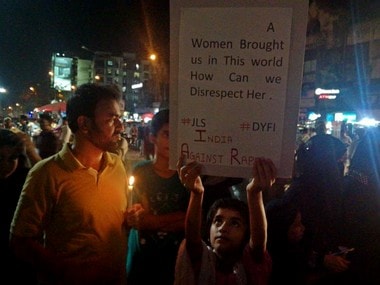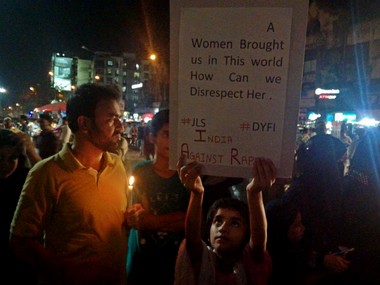Reports of gruesome child sexual abuse have become a regular feature. Buckling under the public outrage following the Kathua, Unnao and Surat rapes, a n ordinance has been promulgated allowing the imposition of the death sentence for the rape of a girl below the age of 12 years. The death penalty is not the solution and will not make our society safer. [caption id=“attachment_4442693” align=“alignleft” width=“380”]  Representational image. Firstpost/Hassan M Kamal[/caption] The imposition of the death penalty for child rape is regressive and counter-intuitive. Instead of reducing cases of rape, it is more likely to further endanger children. This is yet another knee-jerk reaction from the government to tardily appease and sway impending elections. Child rights’ activists have conducted extensive research and their expertise highlights how expecting the death penalty to reduce rapes is based on a number of misconceptions. Misconception 1: Fear of the death penalty will reduce such incidents: The evidence to prove that the death penalty acts as a deterrent for any crime is unsatisfactory. No such link has been sufficiently evidenced. The Justice Verma Committee declared that awarding the death penalty for rape would be regressive and might not have a deterrent effect. We need to expand our understanding of rape beyond sexual violence, and acknowledge that, against the backdrop of centuries of patriarchy, the impetus includes the need to dominate women and girls or the urge to use them as pawns.
Instead of reducing the number of rapes, the death penalty will further endanger children, as the perpetrators would prefer to murder the victim, as in the Kathua case, rather than risk the child testifying in court. Moreover, reportage of child sexual abuse is already dismal, and the peril of death penalty will further discourage families from reporting crimes, particularly when the perpetrator is a known person, as is often the case.
Misconception 2: Punishment for child rape is not enough: On being found guilty of rape under the Indian Penal Code, (IPC), and penetrative sexual assault of a child below 12 years under the Protection of Children from Sexual Offences Act, 2012 (POCSO Act), a person can be punished for a minimum term of 10 years rigorous imprisonment. The maximum punishment under the IPC is imprisonment for the remainder of the person’s natural life. Under the proposed ordinance, the minimum punishment for rape of a girl less than 12 years of age would be 20 years imprisonment extendable to imprisonment for life or death sentence. However, research reveals that the maximum punishment, even as it stands, is hardly ever ordered. In fact, the report highlights that Special Courts award the minimum sentence in majority of the convictions, and even prescribe lower than the mandatory minimum sentence in some cases. Certainty of punishment is what is required to ensure justice; not further enhancement of punishment. Misconception 3: Our criminal justice system is currently equipped to effectively deal with cases of child sexual abuse Under the POCSO Act, 2012, Special Courts were designated to ensure speedy and effective justice, catering to the particular needs of children. However these Special Courts are hardly special in reality. Research demonstrates those involved in delivering justice regularly and flagrantly flout mandated legal procedures. For instance, children are often exposed to the accused, and aggressive questioning of the victims persists, resulting in victims frequently turning hostile, more so in the absence of any witness protection systems. Investigative lapses and problems with age determination are rampant and cases are often delayed beyond the 1-year period prescribed for cases to be completed. According to NCRB’s Crime in India, 2016, a staggering 89 percent of trials under the POCSO Act were pending. Moreover, according to the same report, the conviction rate in cases of rape is a mere 29 percent. Considering that the justice delivery system is already drastically falling short of implementing laws, it is unlikely that they will be able to deal with the heightened burden of proof required to secure a death sentence. Misconception 4: Child sexual abuse is always brutal and mostly perpetrated by strangers: In a large number of cases of sexual offences, the accused is known to the victim: A neighbour, cousin, stepfather or father. In fact, the NCRB’s Crime in India, 2016 figures indicate that in 94.6 percent of case of child sexual abuse, the victim knew the accused. In cases of grooming, there is an emotional connection built over time with the survivor and maybe even with the survivor’s family. In such cases, there is an even stronger unwillingness to report the crime. Reluctance to report the crime is heightened when the family is financially or otherwise dependent on the accused, or the accused is an influential person. The overwhelming pressure, even from police officers and local politicians, to conceal these horrific crimes was evident in both the Kathua and Unnao case. The possibility of a death sentence will invariably have the effect of further silencing and traumatising child survivors who will be burdened with the guilt of sending someone they know well or are even related to, to the gallows. Misconception 5: Survivors want perpetrators to be executed Survivors of child sexual abuse want to be believed. For their story to be taken seriously. With the overpowering social stigma associated with sexual abuse, close family members either distrust the child, or force the child to keep silent. Survivors often feel an overwhelming sense of shame and guilt. Often, more than harsh punishment, the survivor wants for the abuse to stop and for their testimony to be believed. Further, survivors urgently require compensation to assist them in moving house, continuing their education or to seek medical or psycho-social aid, more so when the survivor was financially dependent on the accused. Compensation, however, is rarely awarded by the Special Courts, and is often made conditional on testimony and conviction, thereby defeating the purpose of interim compensation. What should our response be? Instead of focusing on retributive justice and introducing the death penalty as the solution, the underlying psychological and cultural reasons why rapes take place should be borne in mind. • Awareness and prevention drives, challenging stereotypes, identifying at risk children, is required within the community and schools. • Every person involved in the justice delivery system should be sensitised and trained on how to implement the existing laws. • Legal procedures must be stringently abided by and effective, stern accountability measures should be put into place. Officers, lawyers, judges and politicians interfering with and hindering the criminal process should face strict action. • A central-level model victim and witness protection scheme or legislation will provide the much-needed framework for ensuring support and protection to child witnesses. • The compensation scheme addressing sexual offences being drafted by National Legal Services Authority pursuant to the Supreme Court’s direction in Nipun Saxena v. Union of India must be rolled out and implemented. • Rehabilitation measures like counseling and education are vital. • Functional one stop crisis centers should be set up in every district. It is imperative that we focus on preventing such crimes from being committed in the first place, rather than assume that the very far-fetched possibility of the gallows will prevent such crimes, which have been persisting for centuries. The author is a human rights lawyer and has worked with Amnesty International and National Law School’s Center for Child and the Law. She is the coordinator of Jan Ugahi, an NGO that works for children’s rights in south Goa. Her Twitter handle is soniapereira_hr


)

)
)
)
)
)
)
)
)



